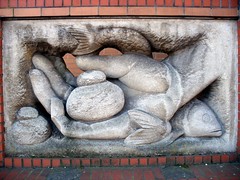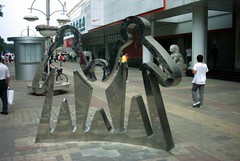December 25, 2012
Benedict vs. Mirandola: how gay rights and transhumanism are related
 It seems that gay rights is closely linked to transhumanism. At least from a conservative Catholic perspective: Pope says same-sex marriage is destroying the ‘essence of humanity’:
It seems that gay rights is closely linked to transhumanism. At least from a conservative Catholic perspective: Pope says same-sex marriage is destroying the ‘essence of humanity’:
People dispute the idea that they have a nature, given to them by their bodily identity, that serves as a defining element of the human being. They deny their nature and decide that it is not something previously given to them, but that they make it for themselves. The manipulation of nature, which we deplore today where our environment is concerned, now becomes man's fundamental choice where he himself is concerned.
This fits in with earlier statements deploring the "cult of health": from his perspective, humans have a fixed God-given essence that cannot be affected (or maybe just infringed upon, like human dignity), and it is given to us as a gift, so we better not mess with it. The speech also claimed that the structure of the family was something absolute; the pope is clearly not into modern gender studies claiming it to be rather fluid and culturally bound. Given that he represents a religion that makes a very big deal about the (human and non-human) family relationships of Jesus this is not too strange, but might open him up to empirical disproof.
Of course, I disagree with the pope.
Human nature: rock or fluid?
 The important difference between me and the pope is that he has an essentialist view of human nature (and hence human dignity): it is something given and fixed, so changing it is both impolite (since it was a gift) and impossible (since it is absolute). We might try, but we will become inauthentic and hence unhappy. This is very much the same argument Michael Sandel makes in a secular form. It also has the same problem: there are obviously many parts of the human condition that are bad and we can and ought to change (ignorance, cruelty), and it is not clear how to delineate which ones are in that category, in the optional category (hair color? circumcision?), and in the impossible and/or bad categories (better than healthy). One can make some arguments for what goes where, but they typically seem to be consequentialist arguments - in which case there is no need to invoke human nature. Deontological arguments run into problems since typically they make claims of the type "One should always do X, when it is possible", and these arguments then produce the "wrong" conclusions as the borders of the possible are shifted by new technology.
The important difference between me and the pope is that he has an essentialist view of human nature (and hence human dignity): it is something given and fixed, so changing it is both impolite (since it was a gift) and impossible (since it is absolute). We might try, but we will become inauthentic and hence unhappy. This is very much the same argument Michael Sandel makes in a secular form. It also has the same problem: there are obviously many parts of the human condition that are bad and we can and ought to change (ignorance, cruelty), and it is not clear how to delineate which ones are in that category, in the optional category (hair color? circumcision?), and in the impossible and/or bad categories (better than healthy). One can make some arguments for what goes where, but they typically seem to be consequentialist arguments - in which case there is no need to invoke human nature. Deontological arguments run into problems since typically they make claims of the type "One should always do X, when it is possible", and these arguments then produce the "wrong" conclusions as the borders of the possible are shifted by new technology.
I think bodily identity does define what kind of beings we are, and if we change our bodies we can become different kinds of beings. This is sometimes a very good thing. We can also change our bodies by changing our mental contents, since our minds and biological brains are inseparable. Thanks to brain plasticity and our amazing freedom of thought and action a single idea can change how a person lives his or her life profoundly. No other organism has this ability. I see this as an expression of what Pico della Mirandola let God say in Oration on the Dignity of Man:
The nature of all other creatures is defined and restricted within laws which We have laid down; you, by contrast, impeded by no such restrictions, may, by your own free will, to whose custody We have assigned you, trace for yourself the lineaments of your own nature. I have placed you at the very center of the world, so that from that vantage point you may with greater ease glance round about you on all that the world contains. We have made you a creature neither of heaven nor of earth, neither mortal nor immortal, in order that you may, as the free and proud shaper of your own being, fashion yourself in the form you may prefer. It will be in your power to descend to the lower, brutish forms of life; you will be able, through your own decision, to rise again to the superior orders whose life is divine.
I have no doubt many believers (like Mirandola) would agree that the flexibility and self-changeability of human minds is what is unique to humans and necessary for being a true moral agent. They would of course be less keen on seeing this as just a property of our biological nature, since they tend towards a dualist stance: they want the important stuff to happen inside the immortal soul. But neuroscience is giving less and less for the soul to do, as we discover how various important processes like moral judgement and sense of self are implemented in various brain systems and quite amenable to change due to changed brains. If brain damage or brain stimulation can make a person behave differently morally, what role is left for the soul?
The family better fit the mold
 But a monist pope could still say that Mirandola was right plus that morality is in the brain, yet many changes that leave our essential flexibility and responsibility unaffected are bad ideas. No argument there. However, the real argument comes about what changes - including lifestyles - are bad. And this is where we get into a culture war.
But a monist pope could still say that Mirandola was right plus that morality is in the brain, yet many changes that leave our essential flexibility and responsibility unaffected are bad ideas. No argument there. However, the real argument comes about what changes - including lifestyles - are bad. And this is where we get into a culture war.
It seems to me that the family obsession of Christianity is very much based on the transcendentalisation of certain family relations typical of humans - parent-child relations, strong altruist bonds to family members, social emotions such as gratitude, and strict gender roles. But the last one does not seem to have the same deep biological basis as the first three: we know a bit about their neuroscience already, but as far as I know there are no neural correlates of fixed gender roles. There are certainly biological gender differences in the brain, but the various meta analyses collected by J.S. Hydes suggest that few of them are very large, and even those that do exist do not have much moral implications. This later point was dealt with at length in Janet Radcliffe Richard's excellent 2012 Uehiro lectures, and she also argued that conservatives of all colors tend to think of the world as having a fixed underlying moral/natural order that must be preserved at all costs - and against all evidence (see here, here and here for a brief summary; the lectures will appear as a book sooner or later). Opposed to this "natural order" view is the view that humans must be active in both structuring the moral order, and changing the world to fit it. We are moral agents, so we better figure out a good morality and try to implement it - all based on empirical data as much as possible. You can guess where I stand.
The pope's model predicts that changed gender roles, such as female suffrage, gender equality and gay rights, produce bad psychological effects. Not just occasional or individual problems (no doubt there are some) but profound malaise since they supposedly interfere with the essential human nature. His model predicts that very equal places like Scandinavia would be hotbeds of mental trouble, while traditional societies should work very well. Playing around a bit with tools like Gapminder tends to dispel that view. Just like anybody predicting dire consequences from new technology the pope can of course claim that they are long-term and invisible so far, but I think we would have seen some effects by now from female suffrage.
Of course, being a dualist the pope could conveniently claim there are profound damage in some spiritual dimension not accessible to empirical study. We Swedes might be thoroughly spiritually corrupt, we just don't know it. Except that if there is no clear way of detecting it even from the inside we will just have to take it on faith, and it is going to be a hard sell to claim something that does provide real, observable benefits to people is actually very bad. It won't be the first time for the Catholic church, of course, but given the past results of opposing contraception the pope should not feel optimistic about doing much good.
Born this way?
 I actually do dislike the essentialist character of the "born this way" claims of much of the LGBT movement: no doubt there is a big biological component, but the same is true for religiosity. And in both cases there is a hefty "unique individual environment" factor. Claiming sexual preferences are not a choice does not resolve any moral obligations (since we do think people are either responsible for their sexuality or incapable, and no activist will accept the second choice as valid). Claiming they are a choice does not show that they are a bad choice. In fact, the best way of arguing for LGBT rights is to argue that there are rights to make pretty radical lifestyle choices: if those arguments hold up, it does not matter what the bio-social underpinnings are.
I actually do dislike the essentialist character of the "born this way" claims of much of the LGBT movement: no doubt there is a big biological component, but the same is true for religiosity. And in both cases there is a hefty "unique individual environment" factor. Claiming sexual preferences are not a choice does not resolve any moral obligations (since we do think people are either responsible for their sexuality or incapable, and no activist will accept the second choice as valid). Claiming they are a choice does not show that they are a bad choice. In fact, the best way of arguing for LGBT rights is to argue that there are rights to make pretty radical lifestyle choices: if those arguments hold up, it does not matter what the bio-social underpinnings are.
Hence I do think there is a strong link between LGBT rights and transhumanism: both (in their best forms) claim that biology and society are not destiny, and can and should be changed in order to achieve flourishing. This flourishing might occur in forms that make little sense to outsiders, but still retain value to the people and communities experiencing it. We need human rights to safeguard this, be they non-discrimination or morphological freedom. The "natural order" has no moral power, it is just preconditions. The fluid human nature does force us to confront an inherent arbitrariness in our existence, but constructing meaningful relationships and moral systems seems eminently possible: there are plenty of constraints from game theory, mutual agreements and the large swatches of human nature nobody wants to touch.
In the end, I think we are again seeing the stasist/dynamist conflict described by Virginia Postrel. The pope has a stasist view, thinking that there are certain fragile and/or sacred values that must be protected by technocratic (or rather, theocratic) experts controlling what advances are allowed (he even mentioned the environment as an intuition pump, exploiting the prevalent intuitions people have about natural orders that drive much of the conservatism in environmental issues). The progressives he deplored, be they LGBT activists or transhumanists, hold liberal dynamist views: let people try to change or stay "who they are" if they want, the important thing is to safeguard this exploration of possibility.
This has been my Christmas sermon.
Posted by Anders3 at December 25, 2012 01:06 AM